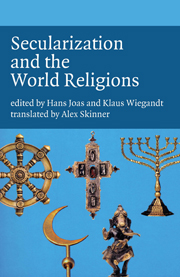Book contents
- Frontmatter
- Contents
- Notes on Contributors
- Foreword
- Society, State and Religion: Their Relationship from the Perspective of the World Religions: An Introduction
- 1 Catholic Christianity
- 2 Protestantism
- 3 The Departure and Return of God: Secularization and Theologization in Judaism
- 4 Islam and Secularization
- 5 Hinduism
- 6 Secularization: Confucianism and Buddhism
- 7 From Hostility through Recognition to Identification: State–Church Models and their Relationship to Freedom of Religion
- 8 ‘Science Doesn't Tremble’: The Secular Natural Sciences and the Modern Feeling for Life
- 9 The Religious Situation in Europe
- 10 The Religious Situation in the USA
- 11 The Religious Situation in East Asia
- 12 The Relevance of the European Model of Secularization in Latin America and Africa
- 13 The Desecularization of the Middle East Conflict: From a Conflict between States to a Conflict between Religious Communities
- Afterword
7 - From Hostility through Recognition to Identification: State–Church Models and their Relationship to Freedom of Religion
- Frontmatter
- Contents
- Notes on Contributors
- Foreword
- Society, State and Religion: Their Relationship from the Perspective of the World Religions: An Introduction
- 1 Catholic Christianity
- 2 Protestantism
- 3 The Departure and Return of God: Secularization and Theologization in Judaism
- 4 Islam and Secularization
- 5 Hinduism
- 6 Secularization: Confucianism and Buddhism
- 7 From Hostility through Recognition to Identification: State–Church Models and their Relationship to Freedom of Religion
- 8 ‘Science Doesn't Tremble’: The Secular Natural Sciences and the Modern Feeling for Life
- 9 The Religious Situation in Europe
- 10 The Religious Situation in the USA
- 11 The Religious Situation in East Asia
- 12 The Relevance of the European Model of Secularization in Latin America and Africa
- 13 The Desecularization of the Middle East Conflict: From a Conflict between States to a Conflict between Religious Communities
- Afterword
Summary
To a significant degree, the origins of the modern Western state as a form of political organization lie in its departure from the medieval unity of state and Christian church. This occurred because the state no longer had to deal only with one Christian church, but rather with Protestantism and Catholicism. The competition between these religions, which was carried on within the various political camps, along with struggles for dominance between religious and political power, made peace impossible. This resulted in the chaos of civil war, and terrible wars between states. The secularization of worldly power thus seemed inevitable over the long term. The idea was that politics should focus on worldly concerns–on worldly welfare. With respect to religious matters, the attainment of salvation in the hereafter, the sword of state power should no longer function as a means of sanction for ensuring the dominance of whichever religion was preferred by the government, though Christian thought long continued to make itself felt. In most European states and in the USA, this development ultimately led to a structural differentiation of the spheres of state and religion or state and church. Areas of responsibility were also divided: the state would take care of worldly welfare, while the churches would attend to salvation in the hereafter. The pursuit of salvation itself was to adhere to the principle of freedom: within the context of freedom of religion, it was to be the responsibility of the individual and his conscience.
- Type
- Chapter
- Information
- Secularization and the World Religions , pp. 160 - 180Publisher: Liverpool University PressPrint publication year: 2009
- 1
- Cited by



